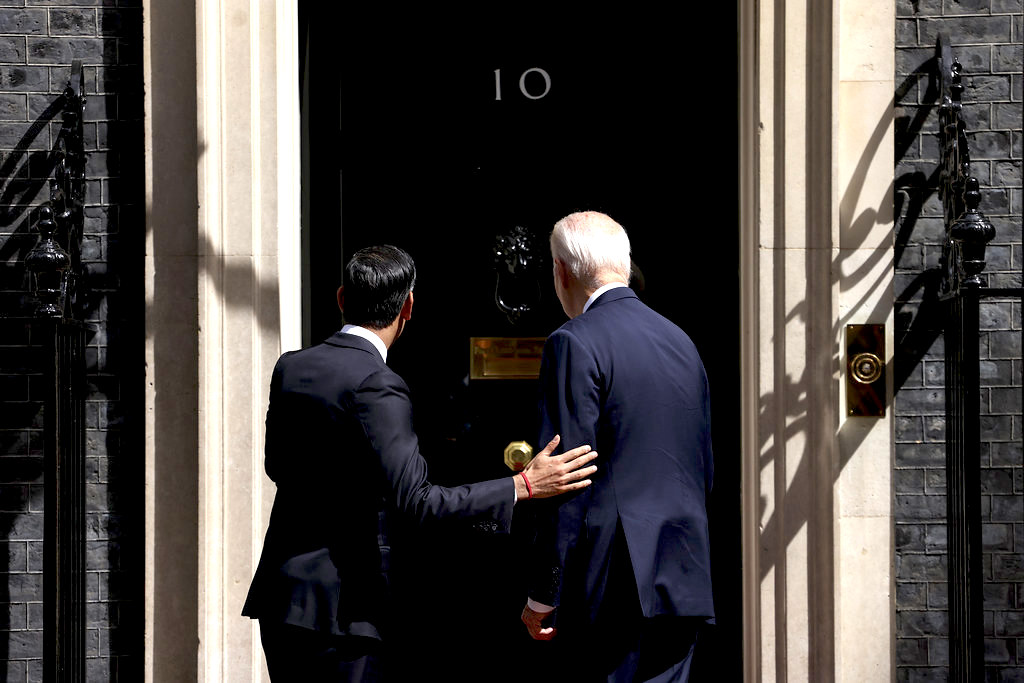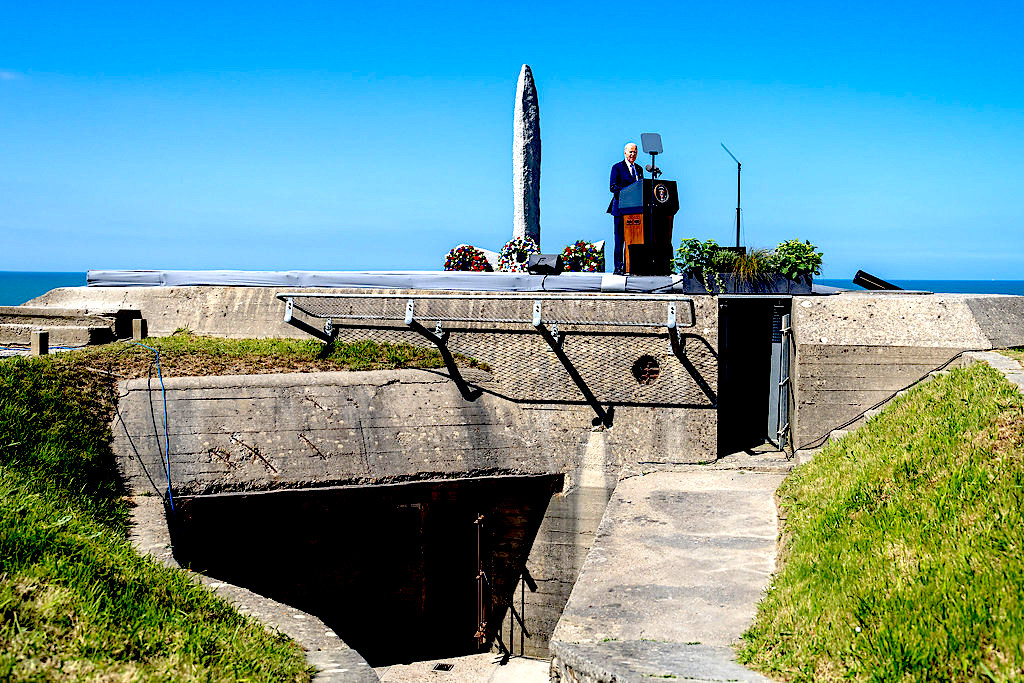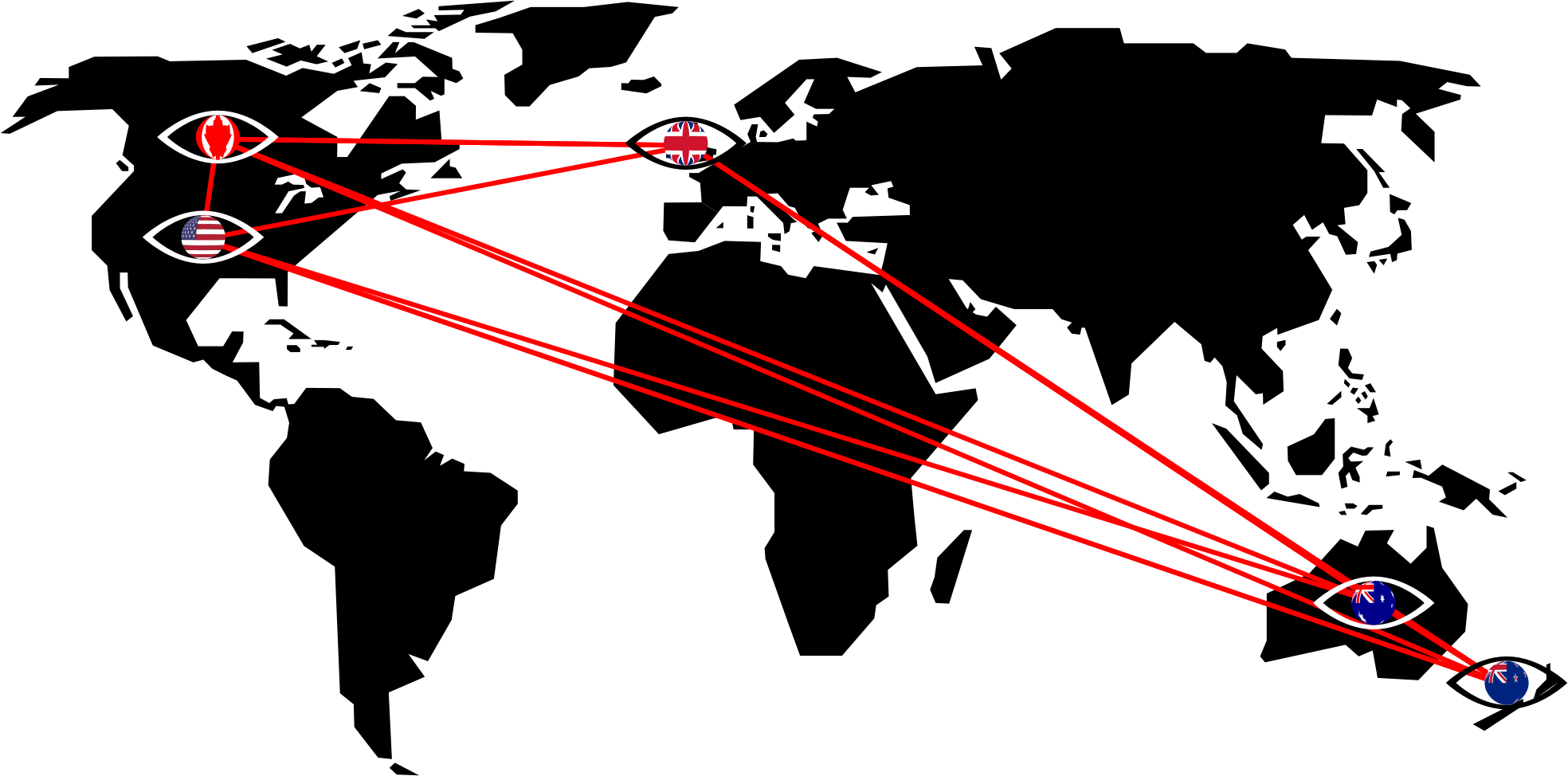The Anglo-Saxonization of American foreign and military policy has become a distinctive — and provocative — feature of the Biden presidency, writes Michael Klare.

U.K. Prime Minister Rishi Sunak and U.S. President Joe Biden in London, July 2023. (Simon Dawson / No 10 Downing, CC BY-NC-ND 2.0)
By Michael T. Klare
TomDispatch.com
 Wherever he travels globally, President Joe Biden has sought to project the United States as the rejuvenated leader of a broad coalition of democratic nations seeking to defend the “rules-based international order” against encroachments by hostile autocratic powers, especially China, Russia and North Korea.
Wherever he travels globally, President Joe Biden has sought to project the United States as the rejuvenated leader of a broad coalition of democratic nations seeking to defend the “rules-based international order” against encroachments by hostile autocratic powers, especially China, Russia and North Korea.
“We established NATO, the greatest military alliance in the history of the world,” he told veterans of D-Day while at Normandy, France on June 6. “Today… NATO is more united than ever and even more prepared to keep the peace, deter aggression, defend freedom all around the world.”
In other venues, Biden has repeatedly highlighted Washington’s efforts to incorporate the “Global South” — the developing nations of Africa, Asia, Latin America and the Middle East — into just such a broad-based U.S.-led coalition. At the recent G7 summit of leading Western powers in southern Italy, for example, he backed measures supposedly designed to engage those countries “in a spirit of equitable and strategic partnership.”
But all of his soaring rhetoric on the subject scarcely conceals an inescapable reality: the United States is more isolated internationally than at any time since the Cold War ended in 1991.
It has also increasingly come to rely on a tight-knit group of allies, all of whom are primarily English-speaking and are part of the Anglo-Saxon colonial diaspora. Rarely mentioned in the Western media, the Anglo-Saxonization of American foreign and military policy has become a distinctive — and provocative — feature of the Biden presidency.
America’s Growing Isolation

Biden delivering remarks on “democracy and freedom” on June 7 in Normandy, France, during D-Day observations. (White House, Adam Schultz)
To get some appreciation for Washington’s isolation in international affairs, just consider the wider world’s reaction to the administration’s stance on the wars in Ukraine and Gaza.
Following Russia’s invasion of Ukraine, Biden sought to portray the conflict there as a heroic struggle between the forces of democracy and the brutal fist of autocracy. But while he was generally successful in rallying the NATO powers behind Kyiv — persuading them to provide arms and training to the beleaguered Ukrainian forces, while reducing their economic links with Russia — he largely failed to win over the Global South or enlist its support in boycotting Russian oil and natural gas.
Despite what should have been a foreboding lesson, Biden returned to the same universalist rhetoric in 2023 (and this year as well) to rally global support for Israel in its drive to extinguish Hamas after that group’s devastating Oct.7 rampage.
But for most non-European leaders, his attempt to portray support for Israel as a noble response proved wholly untenable once that country launched its full-scale invasion of Gaza and the slaughter of Palestinian civilians commenced.

Israeli bombing devastation in Gaza, Dec. 6, 2023. (Tasnim News Agency, Wikimedia Commons, CC BY-SA 4.0)
For many of them, Biden’s words seemed like sheer hypocrisy given Israel’s history of violating U.N. resolutions concerning the legal rights of Palestinians in the West Bank and its indiscriminate destruction of homes, hospitals, mosques, schools, and aid centers in Gaza.
In response to Washington’s continued support for Israel, many leaders of the Global South have voted against the United States on Gaza-related measures at the U.N. or, in the case of South Africa, have brought suit against Israel at the World Court for perceived violations of the 1948 Genocide Convention.
In the face of such adversity, the White House has worked tirelessly to bolster its existing alliances, while trying to establish new ones wherever possible. Secretary of State Antony Blinken has made seemingly endless trips to Asia, Africa, Europe, Latin America, and the Middle East trying to drum up support for Washington’s positions — with consistently meager results.
Here, then, is the reality of this anything but all-American moment: as a global power, the United States possesses a diminishing number of close, reliable allies – most of which are members of NATO, or countries that rely on the United States for nuclear protection (Japan and South Korea), or are primarily English-speaking (Australia and New Zealand). And when you come right down to it, the only countries the U.S. really trusts are the “Five Eyes.”
For Their Eyes Only

Rendering of the “Five Eyes” intelligence network that includes Australia, Canada, New Zealand, the U.K., the U.S. (@GDJ, Openclipart, Public domain)
The “Five Eyes” (FVEY) is an elite club of five English-speaking countries — Australia, Canada, New Zealand, the United Kingdom and the United States — that have agreed to cooperate in intelligence matters and share top-secret information.
They all became parties to what was at first the bilateral UKUSA Agreement, a 1946 treaty for secret cooperation between the two countries in what’s called “signals intelligence” — data collected by electronic means, including by tapping phone lines or listening in on satellite communications. (The agreement was later amended to include the other three nations.)
Almost all of the Five Eyes’ activities are conducted in secret, and its existence was not even disclosed until 2010. You might say that it constitutes the most secretive, powerful club of nations on the planet.
The origins of the Five Eyes can be traced back to World War II, when American and British codebreakers, including famed computer theorist Alan Turing, secretly convened at Bletchley Park, the British codebreaking establishment, to share intelligence gleaned from solving the German “Enigma” code and the Japanese “Purple” code.

Hut No. 1 on the grounds of Bletchley Park. (Toby Oxborrow, Wikimedia Commons, CC BY-SA 2.0)
At first an informal arrangement, the secretive relationship was formalized in the British-U.S. Communication Intelligence Agreement of 1943 and, after the war ended, in the UKUSA Agreement of 1946. That arrangement allowed for the exchange of signals intelligence between the National Security Agency (NSA) and its British equivalent, the Government Communications Headquarters (GCHQ) — an arrangement that persists to this day and undergirds what has come to be known as the “special relationship” between the two countries.

GCHQ’s “doughnut” building in Cheltenham, west England. (U.K. Ministry of Defence, Wikimedia Commons)
Then, in 1955, at the height of the Cold War, that intelligence-sharing agreement was expanded to include those other three English-speaking countries, Australia, Canada, and New Zealand. For secret information exchange, the classification “AUS/CAN/NZ/UK/US EYES ONLY” was then affixed to all the documents they shared, and from that came the “Five Eyes” label. France, Germany, Japan, and a few other countries have since sought entrance to that exclusive club, but without success.
Although largely a Cold War artifact, the Five Eyes intelligence network continued operating right into the era after the Soviet Union collapsed, spying on militant Islamic groups and government leaders in the Middle East, while eavesdropping on Chinese business, diplomatic, and military activities in Asia and elsewhere.
According to former NSA contractor Edward Snowden, such efforts were conducted under specialized top-secret programs like Echelon, a system for collecting business and government data from satellite communications, and PRISM, an NSA program to collect data transmitted via the Internet.

Edward Snowden, on right-hand screen, addressing a TED conference from Russia via telepresence robot, March 18, 2014. (Steve Jurvetson, Flickr, CC BY 2.0)
As part of that Five Eyes endeavor, the U.S., the United Kingdom, and Australia jointly maintain a controversial, highly secret intelligence-gathering facility at Pine Gap, Australia, near the small city of Alice Springs. Known as the Joint Defence Facility Pine Gap (JDFPG), it’s largely run by the NSA, CIA, GCHQ, and the Australian Security Intelligence Organization.
Its main purpose, according to Edward Snowden and other whistleblowers, is to eavesdrop on radio, telephone, and internet communications in Asia and the Middle East and share that information with the intelligence and military arms of the Five Eyes.
Since the Israeli invasion of Gaza was launched, it is also said to be gathering intelligence on Palestinian forces in Gaza and sharing that information with the Israeli Defense Forces. This, in turn, prompted a rare set of protests at the remote base when, in late 2023, dozens of pro-Palestinian activists sought to block the facility’s entry road.
Pro-Palestinian protestors have blocked access to the US surveillance base at Pine Gap in Alice Springs. pic.twitter.com/2vMShKXuDp
— Nick Riemer (@NickRiemer1) October 19, 2023
From all accounts, in other words, the Five Eyes collaboration remains as robust as ever. As if to signal that fact, F.B.I. director Christopher Wray offered a rare acknowledgement of its ongoing existence in October 2023 when he invited his counterparts from the FVEY countries to join him at the first Emerging Technology and Securing Innovation Security Summit in Palo Alto, California, a gathering of business and government officials committed to progress in artificial intelligence (AI) and cybersecurity. Going public, moreover, was a way of normalizing the Five Eyes partnership and highlighting its enduring significance.
Anglo-Saxon Solidarity in Asia
The Biden administration’s preference for relying on Anglophone countries in promoting its strategic objectives has been especially striking in the Asia-Pacific region. The White House has been clear that its primary goal in Asia is to construct a network of U.S.-friendly states committed to the containment of China’s rise.
This was spelled out, for example, in the administration’s Indo-Pacific Strategy of the United States of 2022. Citing China’s muscle-flexing in Asia, it called for a common effort to resist that country’s “bullying of neighbors in the East and South China” and so protect the freedom of commerce. “A free and open Indo-Pacific can only be achieved if we build collective capacity for a new age,” the document stated. “We will pursue this through a latticework of strong and mutually reinforcing coalitions.”
That “latticework,” it indicated, would extend to all American allies and partners in the region, including Australia, Japan, New Zealand, the Philippines, and South Korea, as well as friendly European parties (especially Great Britain and France). Anyone willing to help contain China, the mantra seems to go, is welcome to join that U.S.-led coalition. But if you look closely, the renewed prominence of Anglo-Saxon solidarity becomes ever more evident.
Of all the military agreements signed by the Biden administration with America’s Pacific allies, none is considered more important in Washington than AUKUS, a strategic partnership agreement between Australia, the United Kingdom, and the United States. Announced by the three member states on Sept. 15, 2021, it contains two “pillars,” or areas of cooperation — the first focused on submarine technology and the second on AI, autonomous weapons, as well as other advanced technologies.
As in the FVEY arrangement, both pillars involve high-level exchanges of classified data, but also include a striking degree of military and technological cooperation. And note the obvious: there is no equivalent U.S. agreement with any non-English-speaking country in Asia.
Consider, for instance, the Pillar I submarine arrangement. As the deal now stands, Australia will gradually retire its fleet of six diesel-powered submarines and purchase three to five top-of-the-line U.S.-made Los Angeles-class nuclear-powered submarines (SSNs), while it works with the United Kingdom to develop a whole new class of subs, the SSN-AUKUS, to be powered by an American-designed nuclear propulsion system. But — get this — to join, the Australians first had to scrap a $90 billion submarine deal with a French defense firm, causing a severe breach in the Franco-Australian relationship and demonstrating, once again, that Anglo-Saxon solidarity supersedes all other relationships.

From left, Australian Prime Minister Anthony Albanese, Biden and U.K. Prime Minister Rishi Sunak at an event to celebrate the Australia-United Kingdom-United States, or AUKUS, partnership on March 13, 2023, at Point Loma Naval Base in San Diego. (White House/Adam Schultz)
Now, with the French out of the picture, the U.S. and Australia are proceeding with plans to build those Los Angeles-class SSNs — a multibillion-dollar venture that will require Australian naval officers to study nuclear propulsion in the United States.
When the subs are finally launched (possibly in the early 2030s), American submariners will sail with the Australians to help them gain experience with such systems.
Meanwhile, American military contractors will be working with Australia and the U.K. designing and constructing a next-generation sub, the SSN-AUKUS, that’s supposed to be ready in the 2040s.
The three AUKUS partners will also establish a joint submarine base near Perth in Western Australia.
Pillar II of AUKUS has received far less media attention but is no less important. It calls for American, British, Australian scientific and technical cooperation in advanced technologies, including AI, robotics, and hypersonics, aimed at enhancing the future military capabilities of all three, including through the development of robot submarines that could be used to spy on or attack Chinese ships and subs.
Aside from the extraordinary degree of cooperation on sensitive military technologies — far greater than the U.S. has with any other countries — the three-way partnership also represents a significant threat to China.
The substitution of nuclear-powered subs for diesel-powered ones in Australia’s fleet and the establishment of a joint submarine base at Perth will enable the three AUKUS partners to conduct significantly longer undersea patrols in the Pacific and, were a war to break out, attack Chinese ships, ports, and submarines across the region. I’m sure you won’t be surprised to learn that the Chinese have repeatedly denounced the arrangement, which represents a potentially mortal threat to them.
Unintended Consequences
It’s hardly a surprise that the Biden administration, facing growing hostility and isolation in the global arena, has chosen to bolster its ties further with other Anglophone countries rather than make the policy changes needed to improve relations with the rest of the world.
The administration knows exactly what it would have to do to begin to achieve that objective: discontinue arms deliveries to Israel until the fighting stops in Gaza; help reduce the burdensome debt load of so many developing nations; and promote food, water security, and other life-enhancing measures in the Global South.
Yet, despite promises to take just such steps, Biden and his top foreign policy officials have focused on other priorities — the encirclement of China above all else — while the inclination to lean on Anglo-Saxon solidarity has only grown.
However, by reserving Washington’s warmest embraces for its Anglophone allies, the administration has actually been creating fresh threats to U.S. security.
Many countries in contested zones on the emerging geopolitical chessboard, especially in Africa, the Middle East, and Southeast Asia, were once under British colonial rule and so anything resembling a potential Washington-London neocolonial restoration is bound to prove infuriating to them. Add to that the inevitable propaganda from China, Iran and Russia about a developing Anglo-Saxon imperial nexus and you have an obvious recipe for widespread global discontent.
It’s undoubtedly convenient to use the same language when sharing secrets with your closest allies, but that should hardly be the deciding factor in shaping this nation’s foreign policy. If the United States is to prosper in an increasingly diverse, multicultural world, it will have learn to think and act in a far more multicultural fashion — and that should include eliminating any vestiges of an exclusive Anglo-Saxon global power alliance.
Michael T. Klare, a TomDispatch regular, is the five-college professor emeritus of peace and world security studies at Hampshire College and a senior visiting fellow at the Arms Control Association. He is the author of 15 books, the latest of which is All Hell Breaking Loose: The Pentagon’s Perspective on Climate Change.
This article is from TomDispatch.com.
Views expressed in this article may or may not reflect those of Consortium News.

This article articulates a train of thought I’ve been developing for a long time. Kudos to the author.
“How did it ever come to this?”, one respondent wrote. Well, Europeans have been attacking the rest of the world for over 500 years. Of the successful empires involved in these attacks, the English one has come out on top. Just as it would be more useful to refer to the Christianization of the Latin Empire as the annexation of Christianity, so it is better to say that the English empire never fell, but came under American ownership after 1945.
The English empire is not due to the convenience of having a common language. It is only the White English countries which are included. It is an ethnically based organization. America’s rulers are not being arbitrary in choosing their closest allies from among the White English countries. Ethnicity is one of the fundamental bases of human society and propellants of history.
The sweet spot which I think our rulers are trying to reach is one in which all of the Indo-European countries will be under the English empire’s command. The goal, I believe, is not to destroy Russia or Iran, but to overthrow their governments and convert those countries to allies, a la Germany, Italy, and the Slavic countries.
Now that India is under a Hindu supremacist government, that country may be able to take its place in this Indo-European empire and, indeed, seems eager to do so. This applies to Pakistan, as well.
There are two problems with this. The first is that, in both cases, the countries are not White. I believe the solution to this will be that adopted in S. America: a hierarchy of racial rankings will develop with those claiming unmixed Indo-european heritage at the top and dark skinned persons at the bottom. The other possibility is that Whiteness will be extended to cover all those of mostly Indo-european heritage. This has happened before in the Americas.
The second problem is Islam. Islam, while somewhat Arab centric, is, like Christianity, and international religion. It is not based on the gods of one ethnic group, as are Shinto, Judaism, and Hinduism. So Islam must go if the Indo-european conquest of the globe is to succeed. If this is accomplished, then E. Asia and Africa will have to surrender to the vastly superior force of the new hegemon.
5 eyes… Got it.
Pentagon shape imposed on a world grid.
These Five Eyes speak English. You can’t spell ‘slaughter’ without ‘laughter’ in the English language, nor can you spell ‘danger’ without ‘anger’. That’s all I (need to) know.
And associating/relying with the devil would be acceptable too to this sick mentality.
Five Eyes and Ears requires an entirely new set of brain trusts that we can trust not to destroy our civilization to maximize profits for the military protection racket in runaway military technology drag racing.
It kind of makes sense if you think about it. Anglo-Saxon imperialism spread over much of the globe for centuries. There were other empires to be sure, but they didn’t achieve the global reach of the Anglo-Saxon empire. Now that empire is being challenged both by its victims and those who are resisting becoming victims. This project has run its course. With any luck, humanity can finally relegate this outdated paradigm to the dustbin of history. It’s time to make a better, healthier more peaceful world. If we don’t, nature will dispense with us sooner rather than later.
“Trust” is an interesting, even a loaded term here. It is part of an extensive duplicity that extends itself in most of the language around such events. These are “agreements” as though sides agreed and “alliances” as though goals and intentions were largely shared and mutual.
These relations are easier to understand if one allows that they are hierarchical and forcibly maintained. Hierarchies are easier to understand if one allows that the interests of the top and the base of the hierarchical pyramid are mostly distinct and often conflicting.
Part of what the above determines is how information is shared and withheld within hierarchies. A node of command “leadership” determines the “needs of the organization,” and from that a “need to know” as this applies to personnel. So if you are running a power plant, an engineer is considered to need to know many things about the function of the plant, but few things regarding its administration. Note that this is not related to the needs of the engineer, but to the needs of command in relation to the organization. Command itself, notably, “needs” to understand how to maintain centralized control over personnel, but only a little about the active function of the plant itself.
Inside such a kinda-sorta panopticon, we are to judge our own performances with regard to the values of organizational command. We do not altogether do this, of course. Other nodes develop within the organization, and each distributes and withholds information. Think of the information that you withhold from “command.” Considerable complications happen in this because it is hard for one node to speak to one other without some third listening in, there by creating a different distribution of information and a different understanding.
This is how we get people imagining that support for war in Ukraine or for slaughter in Israel is support for freedom or democracy or some other idea. It is also how another sector decides or holds forth that wars or torture are carried out strictly for profit. The organic melange of any hierarchical organization involves various wills in relative conflict and various (mis)understandings of organizational intent.
Regarding the Five Eyes, I assume that “trust” has to do with feeling confident that some particular measure of relative subordination has been achieved.
Heck, surprised that there is no mention of the King’s Royal Institute of International Affairs aka in the USA as the Council of Foreign Relations. The Brits have never been our friends and must I remind everyone that they didn’t like losing in 1812 and that stated goal of Cecil Rhodes to take us back has never been disavowed by the Crown. Also we must remember that our involvement in the middle east was precipitated with our overthrow of the elected Iranian government for their oil and that “Balfour Agreement” for a racist colonial settler state of Israel. As far as I am concerned the sooner the British machinations are stopped the better. How? Well ostracising the Monarch and seizing most of the assets would be a good start. On the other hand their pushing eugenics and support of a NWO makes me think Brits fed up would have him go the way of Charles I in 1649.
The attack on October 7th was NOT a “rampage”! The Palestinians were not and are not some alien barbaric horde. The Palestinians are fighting for their rights after having been invaded and occupied by European Zionists, subjected to humiliating apartheid laws, had their lands and homes stolen, and their people murdered and tortured for longer than I’ve been alive, and I’m 75 years old.
The information in the article is bad enough. What is not mentioned:
To get around national laws spying on domestic populations, one needs to have an outside country do the work.
So in reality, Australia, Canada, New Zealand, the United Kingdom and the United States have agreed to run operations in each others countries.
This includes intelligence gathering and covert operations.
If caught, send the operators back to the country of origin, and bring in some new guys.
Above all: Keep it quiet, do not mention how much money is spent, all to maintain the status quo!
Works like a charm…
Also, not mentioned is the fact that American forces stationed in five eyes countries and occupied countries (Japan, Germany) are not answerable to local laws. This means they are free to murder and rapes the indigenous populations with no consequences. All signed up and agreed with local governments. How did it ever come to this ?
Five eyes is literally, the USA plus its four poodles and one psychotic attack dog.
Since the rise of BRICS, it is only a matter of time before the complete disintegration of the USA, Five Eyes, NATO and Israel.
Change or die, my preference is for the latter.